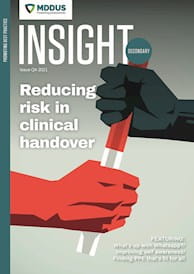These case summaries are based on MDDUS files and are published here to highlight common pitfalls and encourage proactive risk management and best practice. Details have been changed to maintain confidentiality.
BACKGROUND
Dr L, a consultant histopathologist, reviews a lesion taken from the arm of a 79-year-old man, Mr A. She has been given a brief clinical history which notes the patient has sun damaged skin and outlines a diagnosis of actinic keratosis.
Upon analysing the specimen, Dr L observes atypical cells in the epidermis and identifies them as keratinocytes. She decides that the histological changes are consistent with the clinical diagnosis of actinic keratosis.
SEVEN MONTHS LATER
Dr L is informed that Mr A has attended the hospital with local recurrence and has been found to have regressed melanoma. A biopsy and further investigation reveals metastatic melanoma.
Dr L looks again at the previous specimen and realises the atypical cells she observed are actually melanocytes, not keratinocytes. She is extremely upset to have missed the signs of melanoma and wishes to express her regret to Mr A directly, although the patient has not yet made any complaint to the hospital about his care.
She calls MDDUS for advice on how to proceed.
ANALYSIS/OUTCOME
An MDDUS medico-legal adviser (MLA) discusses the details of the case with Dr L and asks to see the histology report. She notes that the patient’s melanoma has been diagnosed and he is receiving treatment from the correct team for this.
On the matter of contacting the patient to notify him of the delayed diagnosis and to apologise, the MLA discusses Dr L’s professional and legal duty of candour. She advises Dr L to liaise with senior hospital staff to assess the best way to contact Mr A without delay to inform him of the delayed diagnosis. Having had no direct patient contact, it would not be appropriate for Dr L to write to him unannounced.
In the meantime, the MLA suggests that Dr L could complete her own reflection, detailing what happened, why it happened, what she has learned and what she will change in her practice going forward. The adviser offers to review the analysis. Dr L is also advised to ensure the matter has been reported through her local employer’s adverse incident reporting policy.
Dr L explains that she has discussed the matter with a senior histopathology colleague who has been very supportive and reassured her that the melanoma was very easy to miss. The colleague was also of the opinion that actinic keratosis was consistent with the clinical diagnosis suggested in the patient’s history.
The MLA also offers reassurance to Dr L, who regrets not exploring the possibility of a second diagnosis when she reported the original sample. Despite having never knowingly missed a diagnosis in her 10 years as a consultant, Dr L says that in future she will be more suspicious of apparently routine cases and even more careful to consider the presence of melanoma.
Should a formal complaint be made about the missed diagnosis, the MLA reassures Dr L that MDDUS will be on hand to guide her step by step through the process.
KEY POINTS
- Be familiar with your duty of candour and local reporting policies.
- Be open to considering alternative diagnoses to those suggested in the patient’s clinical record. Have a high degree of suspicion when reviewing skin lesions, even in apparently routine cases.
- Take the opportunity to review significant events and learn from them.
- Contact MDDUS for detailed advice and support if you suspect you have made a clinical error.
This page was correct at the time of publication. Any guidance is intended as general guidance for members only. If you are a member and need specific advice relating to your own circumstances, please contact one of our advisers.
Read more from this issue of Insight Secondary

Save this article
Save this article to a list of favourite articles which members can access in their account.
Save to library
